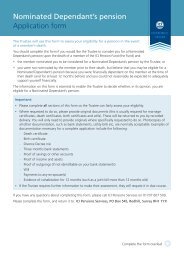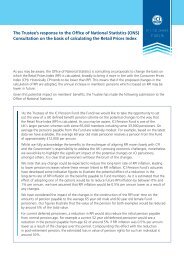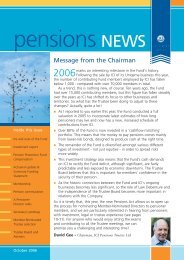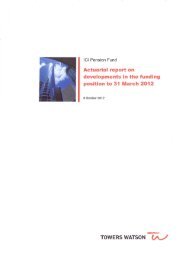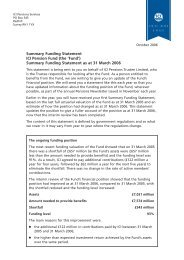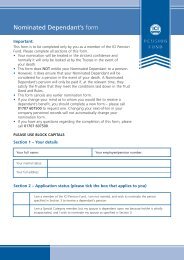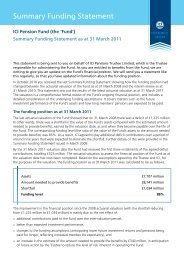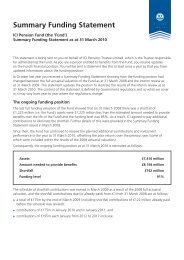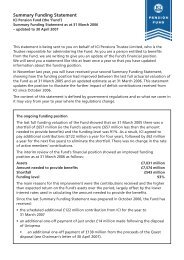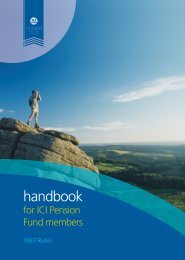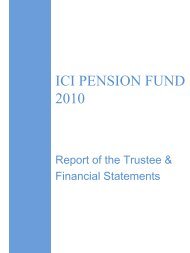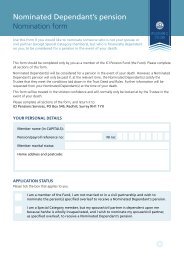pensions news 2010 - ICI Pension Fund
pensions news 2010 - ICI Pension Fund
pensions news 2010 - ICI Pension Fund
You also want an ePaper? Increase the reach of your titles
YUMPU automatically turns print PDFs into web optimized ePapers that Google loves.
<strong>pensions</strong> <strong>news</strong> <strong>2010</strong><br />
In this issue<br />
• Financial summary<br />
• Actuarial update<br />
• Investment review<br />
• How the <strong>Fund</strong> is<br />
invested<br />
• Our new Trustee Director<br />
• Becoming a Member<br />
Nominated Director (MND)<br />
• Secretary’s postbag<br />
• What a new UK<br />
Government means<br />
for <strong>pensions</strong><br />
• <strong>Fund</strong> <strong>news</strong> and updates<br />
• <strong>Fund</strong> help and information<br />
• Trustee team<br />
OCTOBER <strong>2010</strong><br />
David Gee<br />
Chairman,<br />
<strong>ICI</strong> <strong>Pension</strong>s<br />
Trustee<br />
Limited<br />
Chairman’s message<br />
Welcome to <strong>Pension</strong>s<br />
News <strong>2010</strong>. I am very<br />
pleased to confirm that a<br />
pension increase of 4.8%<br />
was awarded to the<br />
pensioners of the <strong>Fund</strong> this<br />
year, in stark contrast to<br />
last year’s position when no<br />
increase was awarded for the<br />
first time in over 40 years. This<br />
is because pension increases<br />
are determined by the rate of<br />
the Retail Price Index (RPI) for<br />
July of each year.<br />
This year has seen further<br />
recovery of the <strong>Fund</strong>’s<br />
position following the<br />
economic upheaval of the<br />
last two years. The <strong>Fund</strong>’s<br />
assets have grown steadily<br />
this year, increasing by<br />
£752 million. In the<br />
background, the Trustee<br />
has been reviewing its<br />
processes and practices<br />
in order to ensure that<br />
the management of the<br />
<strong>Fund</strong> remains efficient<br />
and effective. The <strong>Fund</strong><br />
Secretariat, <strong>Pension</strong>s<br />
Secretariat Services, which<br />
became independent of the<br />
Company two years ago is<br />
now firmly established and<br />
continues to develop the<br />
range of support it provides<br />
to the Board.<br />
This year has also marked<br />
some changes in the team<br />
responsible for running the<br />
<strong>Fund</strong>. Firstly, we have a new<br />
Member Nominated Director,<br />
Sue McMahon (you can<br />
read her first impressions of<br />
the <strong>Fund</strong> on page 4). I hope<br />
reading about her experience<br />
will inspire some of you to<br />
consider applying for a role as<br />
a Trustee Director in future.<br />
We also have a new Scheme<br />
Actuary, David Donneky,<br />
replacing Robert Hails who<br />
is due to retire, having<br />
worked with this <strong>Fund</strong> for<br />
over 25 years.<br />
But there are always new<br />
challenges ahead, a new<br />
Government means new<br />
policies and the Trustee<br />
is busy monitoring new<br />
legislative proposals for<br />
<strong>pensions</strong> and assessing how<br />
this may impact members<br />
of the <strong>Fund</strong>. Our work will<br />
continue and, next year, we<br />
shall be expanding the scope<br />
of our <strong>Fund</strong> website to inform<br />
members more quickly of<br />
key developments and to<br />
encourage members to put<br />
themselves forward as<br />
Trustee Directors.
Financial summary<br />
These figures<br />
have been<br />
extracted from<br />
the <strong>Fund</strong>’s<br />
Annual Report<br />
and Accounts,<br />
as audited by<br />
KPMG LLP<br />
Ins and outs of the <strong>Fund</strong> for the year to 31 March <strong>2010</strong><br />
How the money came in £m<br />
• Contributions 197<br />
• Investment income 110<br />
Total income 307<br />
How the money went out<br />
• <strong>Pension</strong>s -475<br />
• Cash lump sum in exchange for pension -22<br />
• Transfers to other funds -10<br />
Total expenditure -507<br />
Change in the <strong>Fund</strong><br />
•Balance of income and expenditure -200<br />
•Change in market value 952<br />
Total change in the <strong>Fund</strong> 752<br />
Total assets • £7,416 million<br />
2<br />
Robert Hails<br />
Previous<br />
Scheme<br />
Actuary<br />
Actuarial update<br />
The 2008 formal valuation of the <strong>Fund</strong> was<br />
signed off in March 2009 and the revised<br />
contribution levels were introduced with<br />
effect from 1 May last year. The Summary<br />
<strong>Fund</strong>ing Statement, being distributed with<br />
this edition of <strong>Pension</strong>s News, includes details<br />
of the approximate update of the financial<br />
position of the <strong>Fund</strong> as at 31 March <strong>2010</strong>.<br />
The Summary <strong>Fund</strong>ing Statement is part of<br />
the Trustee’s process for monitoring progress<br />
against the agreed funding plan and how<br />
our assumptions about life expectancy<br />
compare with the developing experience of<br />
<strong>ICI</strong> <strong>Fund</strong> pensioners.<br />
Payment of the agreed deficit contributions<br />
by the Company, along with the favourable<br />
investment performance since March 2009,<br />
have improved the <strong>Fund</strong>’s financial position,<br />
although economic conditions remain<br />
uncertain. The contribution levels will be<br />
reviewed as part of the next formal actuarial<br />
valuation of the <strong>Fund</strong>, which is due to be<br />
carried out as at 31 March 2011.<br />
Responsibility for undertaking the 2011<br />
formal valuation will pass to my colleague<br />
David Donneky, in anticipation of my<br />
forthcoming retirement. My retirement will<br />
draw to a close my association with the <strong>Fund</strong>,<br />
which has spanned more than 25 years,<br />
having begun in 1985 when I joined R Watson<br />
& Sons, including the role as the appointed<br />
Scheme Actuary to the <strong>Fund</strong> since 1999.<br />
David, who has now formally been appointed<br />
as Scheme Actuary to the <strong>Fund</strong>, brings<br />
considerable experience to the<br />
role, having worked as an<br />
actuarial consultant for over<br />
28 years with (what is now)<br />
Towers Watson and as the<br />
lead <strong>pensions</strong> consultant and<br />
scheme actuary to some of<br />
Towers Watson’s largest<br />
pension schemes, with<br />
combined assets approaching<br />
£40 billion.<br />
David<br />
Donneky<br />
New Scheme<br />
Actuary
Investment review<br />
for the year ending March <strong>2010</strong><br />
There has been strong short-term recovery in financial markets<br />
since March 2009, particularly in the fast growing economies<br />
of Asia and Latin America. However, the slowdown in the<br />
recovery of the UK economy in the second quarter of <strong>2010</strong> has<br />
raised concerns about the future.<br />
The Trustees continue to monitor the investment strategy<br />
to make sure it’s robust in these times of challenging market<br />
conditions. The <strong>Fund</strong>’s performance recovered over the year<br />
– it maintained its lower-risk investment strategy, which aims<br />
to match expected future cashflow out of the <strong>Fund</strong>, whilst<br />
minimising volatility in the <strong>Fund</strong>’s value. Even though this<br />
strategy limited the impact of the improvements in equity<br />
markets on the <strong>Fund</strong>’s value during the year, it also means the<br />
<strong>Fund</strong> is better protected during financial downturns. This was<br />
evident from our experience during the significant downturns<br />
experienced in 2001-2003 and 2007-2009 when the <strong>Fund</strong><br />
weathered the financial storms better than many other<br />
pension funds.<br />
The <strong>Fund</strong>’s performance<br />
The <strong>Fund</strong>’s performance is measured against benchmarks<br />
set by the Trustee Board – they measure how well each<br />
investment manager has performed. The table below shows<br />
the total performance of the <strong>Fund</strong>’s investment managers<br />
over one, three and 10-year periods. You’ll notice that the<br />
investment managers over the year to 31 March worked well,<br />
outperforming their benchmarks.<br />
Dramatic changes in investment markets, such as those<br />
occurring between 2007 and <strong>2010</strong>, emphasise the importance<br />
of judging pension fund performance over long periods of<br />
time. Over the past 10 years the <strong>Fund</strong> has delivered a positive<br />
return 1% ahead of its benchmark.<br />
How the <strong>Fund</strong> is invested<br />
Note:<br />
investments in<br />
pooled funds<br />
are included<br />
in the nearest<br />
equivalent<br />
asset class.<br />
2%<br />
13%<br />
5% 3%<br />
8%<br />
69%<br />
• Inflation-protected bonds<br />
• Fixed-interest bonds<br />
• UK equities<br />
• Global equities<br />
• Emerging market/high yield<br />
and global bonds<br />
• Other<br />
<strong>ICI</strong>PF – Performance vs <strong>Fund</strong> benchmark<br />
Year to Last 3 years Last 10 years<br />
31 March <strong>2010</strong><br />
Actual 15.6% 6.6% 5.5%<br />
Benchmark 9.0% 8.0% 4.4%<br />
3
Our new Trustee Director<br />
Sue<br />
McMahon<br />
Trustee<br />
Director<br />
Sue McMahon joined the<br />
Trustee Board of the <strong>Fund</strong><br />
in June this year.<br />
Sue joined <strong>ICI</strong> in 1986 as a<br />
graduate trainee within the<br />
‘Engineering Department’.<br />
During her 12 years with the<br />
Company she enjoyed various<br />
engineering and technical<br />
management roles. In the late<br />
1990s, as <strong>ICI</strong> restructured,<br />
Sue returned to university to<br />
study for a Masters Degree<br />
in Business Administration<br />
(MBA) and subsequently<br />
worked at director level in a<br />
range of businesses before<br />
giving up full-time work two<br />
years ago. Sue’s interests<br />
include hiking and gardening,<br />
and she has recently learned<br />
to play Bridge.<br />
What attracted<br />
Q<br />
you to the role of<br />
Trustee Director?<br />
A: Having given up full-time<br />
work I was looking for an<br />
opportunity to continue to<br />
use my business skills, but<br />
on a much more ‘part-time’<br />
basis. In considering our<br />
own financial position, my<br />
husband and I had learned<br />
quite a bit about <strong>pensions</strong>,<br />
and through this process<br />
I had come to appreciate<br />
what a fantastic scheme the<br />
<strong>ICI</strong> <strong>Pension</strong> <strong>Fund</strong> was. When<br />
I saw the invitation in last<br />
year’s <strong>Pension</strong>s News<br />
I couldn’t resist.<br />
What are your<br />
Q<br />
impressions of the<br />
Trustee Director role so far?<br />
A: Whilst the role is a<br />
demanding one (the <strong>ICI</strong> <strong>Fund</strong><br />
is one of the largest private<br />
pension schemes in the UK,<br />
and the complexity is no<br />
less than that of any large<br />
business), I’m part of a very<br />
capable team and the training<br />
and support I have received<br />
have been excellent. I would<br />
also say that, based on my<br />
impressions so far, the interest<br />
and the learning from this<br />
role will be on a par with any<br />
other Non-Executive Director<br />
Role I might have taken. It<br />
has already brought me into<br />
contact with some of the best<br />
legal and financial advisors in<br />
the UK, as well as senior<br />
civil servants.<br />
What skills do<br />
Q<br />
you expect to gain<br />
from your role as a<br />
Trustee Director?<br />
A: I suppose the most<br />
obvious areas of potential<br />
learning from this role are<br />
the development of financial<br />
understanding, and also<br />
exposure to the principles of<br />
Corporate Governance which<br />
might apply to any large<br />
financial entity. I perhaps<br />
didn’t anticipate beforehand<br />
the range of legal issues<br />
I would come into contact<br />
with as a member of the<br />
Trustee Board, and I find<br />
the briefings from legal<br />
advisors invaluable.<br />
Over my five-year period in<br />
office I expect to learn quite a<br />
lot about Trust and <strong>Pension</strong>s<br />
law! It’s also nice to be part<br />
of such a varied team in terms<br />
of both the personalities and<br />
backgrounds. The Trustee<br />
Board is currently 12 strong<br />
and my fellow Directors have<br />
many years of Trustee Board<br />
experience between them.<br />
The culture is very much<br />
one of collaboration and<br />
consensus building.<br />
How are UK<br />
Q<br />
<strong>pensions</strong> changing?<br />
A: I think that I have probably<br />
come on to the <strong>pensions</strong><br />
scene at one of the most<br />
interesting and challenging<br />
times. Not a month seems<br />
to go by without some new<br />
information or potential<br />
changes to legislation coming<br />
to light. Recent examples<br />
include the end to compulsory<br />
retirement ages, changes to<br />
State pension qualifying age,<br />
the Government’s stated<br />
intent to change the financial<br />
index used to govern<br />
increases to public sector<br />
<strong>pensions</strong>, and the legal<br />
requirement to purchase<br />
annuities by age 75. The list<br />
seems to go on and on.<br />
4
Becoming a Member-Nominated<br />
Director (MND)<br />
As each new ‘story’<br />
breaks, the <strong>ICI</strong> <strong>Pension</strong><br />
<strong>Fund</strong> Board, supported by<br />
professional advisors and the<br />
full-time Secretariat team,<br />
swiftly moves into action to<br />
understand not only what<br />
the immediate impact might<br />
be on our <strong>Fund</strong> members,<br />
but also to anticipate<br />
what other changes might<br />
logically follow. They ensure<br />
that appropriate lobbying<br />
takes place to defend <strong>Fund</strong><br />
members’ interests.<br />
Q<br />
What do you<br />
see as the most<br />
important qualities of a<br />
Trustee Director?<br />
A: Being a Trustee Director<br />
is essentially about looking<br />
after other people’s property<br />
and interests, so basic honesty<br />
and the wish to ‘do the right<br />
thing’ have to be high on the<br />
list. Beyond that I think it’s<br />
probably natural curiosity and<br />
the ability and appetite to<br />
continue learning. Even the<br />
Trustee Directors who have<br />
been performing the role for<br />
some time have to continually<br />
rise to the challenge of ever<br />
more complex legislation, a<br />
rapidly changing economic<br />
landscape, and an increasing<br />
choice of potential investment<br />
vehicles. Finally, I think it’s<br />
about being able to fit in<br />
as part of a team whilst<br />
maintaining your ability to<br />
think independently.<br />
Are you interested in becoming a Member-Nominated<br />
Director (MND) of the <strong>ICI</strong> <strong>Pension</strong> <strong>Fund</strong>? It is an<br />
opportunity to be involved in running one of the biggest<br />
funds in the UK and would be of interest to anyone who<br />
enjoys a challenge and working a part of team.<br />
What does being a MND involve?<br />
Commitment<br />
Being a MND nowadays typically involves devoting at<br />
least 15 days a year to attending Trustee Board meetings,<br />
committee meetings and training events, with as much<br />
time again needed to study papers in advance. Due to<br />
the complex nature of pension schemes, all Trustee<br />
Directors of the <strong>Fund</strong> are required to successfully complete<br />
the <strong>Pension</strong> Regulator’s trustee toolkit within 12 months<br />
of their appointment.<br />
Development<br />
Training on all aspects of the role and the key decisions<br />
that you will need to make as part of the Trustee Board is<br />
provided to all Trustee Directors. In addition, the Company<br />
supports the <strong>Fund</strong> by allowing Trustee Directors who are<br />
Company employees time off from their normal duties<br />
and, since 2005, has also paid pensioner directors to<br />
compensate for the time required.<br />
To find out more about what is involved in being on<br />
a trustee board, you can visit the <strong>Pension</strong>s Regulator’s<br />
website at www.the<strong>pensions</strong>regulator.gov.uk and, in<br />
particular, their training website www.trusteetoolkit.com<br />
What is the application process?<br />
To be nominated as a MND, you must be a contributing<br />
member, deferred member or pensioner member of the<br />
<strong>Fund</strong>. You will also need to provide proof that three other<br />
<strong>Fund</strong> members support your nomination for this role.<br />
Once we have received your nomination, it will remain<br />
valid for three years.<br />
Once a vacancy arises, we will ask you to complete<br />
a detailed questionnaire which will be the basis of the<br />
selection process.<br />
If you are interested in applying for a role as a MND,<br />
please contact <strong>ICI</strong> <strong>Pension</strong>s Services who will send you<br />
a detailed information pack on the nomination and<br />
selection process. Full instructions about how to apply are<br />
included in this pack. Anyone wishing to put forward their<br />
nomination for the role should do so by 31 March 2011.<br />
5
Secretary’s postbag: Q&As<br />
I am not married to<br />
Q<br />
my partner, can I be<br />
sure that the <strong>Fund</strong> will<br />
look after my partner if<br />
I die first?<br />
A: If you are not married<br />
but have a partner, they<br />
may still be able to obtain<br />
a nominated dependant’s<br />
pension. However, this is not<br />
payable automatically. Your<br />
partner will have to apply for<br />
this benefit and show that<br />
they meet all the relevant<br />
criteria set out in the <strong>Fund</strong><br />
Rules. In broad terms, this<br />
means they will have to show<br />
that they were financially<br />
dependent on you at the<br />
time of your death and also<br />
that they cannot meet their<br />
future living expenses without<br />
assistance from the <strong>Fund</strong>.<br />
Other eligibility rules also<br />
apply, so this means there is<br />
no guarantee that they would<br />
receive a pension. Where<br />
a nominated dependent’s<br />
pension is awarded, they<br />
may not receive the same<br />
level of pension that would<br />
have been paid automatically<br />
under the <strong>Fund</strong> Rules to<br />
your spouse, had you been<br />
married. (Special rules apply<br />
to marriages of less than six<br />
months and civil partnerships.)<br />
If the Trustee awards a<br />
nominated dependant’s<br />
pension, they will give your<br />
partner a sum to cover his<br />
or her core living expenses<br />
(determined by the Trustee<br />
and subject to the maximum<br />
amount specified in the<br />
<strong>Fund</strong> Rules). In general, ‘core<br />
living expenses’ are the<br />
costs required to meet<br />
day-to-day living expenses.<br />
The Trustee will take into<br />
account your partner’s<br />
individual circumstances in<br />
determining the total of his<br />
or her core living expenses.<br />
Decisions on nominated<br />
dependant’s <strong>pensions</strong> are<br />
made based on your partner’s<br />
eligibility at the time of your<br />
death, so we cannot say in<br />
advance whether he or she<br />
would qualify and, if so,<br />
how much pension would<br />
be payable.<br />
Q<br />
I<br />
want to take early<br />
retirement but I have<br />
been told that I can’t.<br />
Don’t the <strong>Fund</strong> Rules say<br />
I am allowed to retire early<br />
if I want to?<br />
A: The <strong>Fund</strong> has a provision<br />
that allows members to take<br />
early retirement from age<br />
50, subject to a reduction<br />
being applied to the benefits<br />
to allow for the fact that the<br />
pension is being taken early<br />
and, therefore, is expected to<br />
be payable for a longer period<br />
(for a small group of members<br />
who left the <strong>Fund</strong> and<br />
rejoined after 6 April 2006,<br />
the minimum age is 55).<br />
Although this right is in the<br />
<strong>Fund</strong> Rules, there are some<br />
circumstances where the<br />
Trustee may be unable to pay<br />
out your pension early<br />
on request.<br />
The <strong>Fund</strong> is ‘contracted<br />
out’ of the additional state<br />
pension, commonly known<br />
as the State Second <strong>Pension</strong><br />
(S2P) and formerly known as<br />
the State Earnings Related<br />
<strong>Pension</strong> Scheme (SERPS).<br />
This means that the Company<br />
has chosen not to pay<br />
contributions into the S2P on<br />
behalf of its members. The<br />
rate of National Insurance<br />
contributions paid by active<br />
members of the <strong>Fund</strong> is also<br />
reduced as a consequence<br />
of this decision. One of the<br />
conditions of ‘contracting<br />
out’ is that the <strong>Fund</strong> must<br />
ensure that any pension put<br />
into payment is broadly the<br />
same as the pension that you<br />
would have received from<br />
State <strong>Pension</strong> Age (SPA) if you<br />
had continued to pay into the<br />
additional state pension for<br />
service prior to 6 April 2007.<br />
This minimum entitlement<br />
is known as a Guaranteed<br />
Minimum <strong>Pension</strong> (GMP).<br />
The legislation that governs<br />
‘contracting out’ of the S2P<br />
takes precedence over the<br />
<strong>Fund</strong> Rules. This is called<br />
overriding legislation.<br />
This means that this law<br />
must be complied with<br />
even if the <strong>Fund</strong> Rules say<br />
something different.<br />
Prior to September 2009<br />
it was Trustee practice to<br />
6
put a nominal pension into<br />
payment when a member<br />
applied for early retirement<br />
and their benefits (after<br />
applying a reduction for early<br />
payment) were projected to<br />
be insufficient to cover the<br />
GMP at SPA. However, this<br />
practice was not required by<br />
law. It required a member’s<br />
benefits to be recalculated<br />
and adjusted for the future<br />
when they reached SPA, to<br />
take account of the fact that<br />
a nominal pension had been<br />
paid up to that point and the<br />
pension payable from SPA<br />
must be at least equal to the<br />
member’s GMP. This often<br />
resulted in the removal of any<br />
tax free lump sum option and<br />
the initial pension payable to<br />
a member being significantly<br />
lower than he or she would<br />
have expected.<br />
Since September<br />
2009 (based on actuarial<br />
assessment and after taking<br />
further legal advice), the<br />
Trustee has withdrawn this<br />
practice in cases where<br />
member entitlements are<br />
projected to be insufficient to<br />
meet their GMP at SPA after<br />
the early retirement reduction<br />
has been applied. However,<br />
this will generally depend on<br />
the nature of the member’s<br />
individual benefits and how<br />
long before normal retirement<br />
age he or she wishes to retire.<br />
Why are some<br />
Q<br />
retirement quotes<br />
lower than previous quotes<br />
I have received?<br />
A: When requesting quotes<br />
for early payment of your<br />
deferred benefits, the amount<br />
of pension quoted reflects<br />
the value of your benefits<br />
at that particular point in<br />
time. In common with all<br />
other final salary schemes,<br />
this calculation is done using<br />
the actuarial factors in force<br />
at the time the quote was<br />
requested. The amount of<br />
pension quoted will also<br />
reflect the reduction applied<br />
to any benefits paid before<br />
normal retirement age,<br />
taking into account that<br />
they are expected to be paid<br />
for longer.<br />
These actuarial factors take<br />
into account things like the<br />
level of return/profit the <strong>Fund</strong><br />
may expect to receive on its<br />
investments, the estimated<br />
level of inflation and interest<br />
rates that may be applicable<br />
during the period until the<br />
member retires and the period<br />
that the member is expected<br />
to receive his or her pension<br />
(this will, for example,<br />
influence the increases made<br />
to that pension before and<br />
after it is paid). The Trustee<br />
is required by law to take<br />
advice from an actuary on<br />
these factors and to review<br />
them regularly, taking into<br />
account changes in the<br />
economic environment.<br />
A previous edition of<br />
<strong>Pension</strong>s News informed<br />
members that the future<br />
revaluation of deferred<br />
benefits would be done in line<br />
with the strict application of<br />
the <strong>Fund</strong> Rules and legislative<br />
requirements. Some members<br />
may find that the net effect of<br />
the changes in the revaluation<br />
of deferred benefits and the<br />
actuarial factors has reduced<br />
the value of their pension,<br />
compared with previous<br />
quotes received, even though<br />
the early retirement reduction<br />
is lower because the member<br />
is closer to their normal<br />
retirement age.<br />
Why is <strong>Pension</strong>s News<br />
Q<br />
now being printed on<br />
lighter-weight paper?<br />
A: Since Royal Mail introduced<br />
different charges for large and<br />
standard size mail, the cost of<br />
posting <strong>Pension</strong>s News (which<br />
was previously issued in an<br />
A4 sized envelope) has risen<br />
significantly. So, last year, the<br />
Trustee decided to reduce<br />
the postage costs for issuing<br />
<strong>Pension</strong>s News by folding the<br />
<strong>news</strong>letter so that it would<br />
fit into an A5 sized envelope<br />
and therefore be classed as<br />
standard-size mail. To fold<br />
<strong>Pension</strong>s News in this way,<br />
we had to switch to<br />
lighter-weight paper.<br />
Introducing this change can<br />
save the fund up to 35p per<br />
letter in postage costs and<br />
for a <strong>Fund</strong> with over 65,000<br />
members, that can represent<br />
a significant cost saving. Last<br />
year we saved over £20,000<br />
in this way.<br />
7
What a new UK Government means for <strong>pensions</strong><br />
The new coalition<br />
Government has proposed<br />
some significant changes to<br />
UK pension saving laws,<br />
which will be subject to<br />
consultation before becoming<br />
law. Please note, the articles<br />
below are intended to give<br />
members an overview of the<br />
current proposals. However,<br />
the extent to which the<br />
<strong>Fund</strong> members will be<br />
affected will depend on<br />
the final proposals that<br />
become law and the<br />
individual circumstances of<br />
affected members.<br />
8<br />
Changes to the<br />
calculation of<br />
<strong>pensions</strong> increases<br />
Earlier this year the<br />
Government announced<br />
proposals to change statutory<br />
rules when calculating<br />
inflation-linked pension<br />
increases for private-sector<br />
pension schemes. The<br />
announcement indicated that<br />
they would replace the Retail<br />
Price Index (RPI) with the<br />
Consumer Prices Index (CPI).<br />
Recent experience shows that<br />
the CPI tends to give lower<br />
increases over time. However,<br />
at present it is not clear if<br />
the proposals will affect our<br />
members’ rights under the<br />
<strong>Fund</strong> Trust Deed & Rules.<br />
The Trustee is monitoring<br />
the situation and is waiting<br />
for full details from the<br />
Government so that we can<br />
assess the potential impact on<br />
the <strong>Fund</strong>. We will write to you<br />
if we consider that there is<br />
an imminent change to<br />
members’ benefits. In the<br />
meantime, please check the<br />
website regularly.<br />
Changes to tax relief<br />
To help simplify pension<br />
tax relief rules, the<br />
Government is planning to<br />
restrict pension tax relief from<br />
6 April 2011 by reducing the<br />
annual allowance (currently<br />
£255,000) to £50,000 a year.<br />
This measure would replace<br />
the higher-earners pension<br />
tax regime which the Labour<br />
Government had intended to<br />
bring into effect in April 2011.<br />
The anti-forestalling regime,<br />
which impacts those earning<br />
£130,000 and above, will<br />
remain in force for pension<br />
contributions until April 2011.<br />
This reduced annual<br />
allowance figure will impact<br />
significantly more people who<br />
are saving for retirement.<br />
Members should remember<br />
that these limits will affect<br />
all retirement savings, not<br />
just your benefits in the<br />
<strong>ICI</strong> <strong>Pension</strong> <strong>Fund</strong>.<br />
Phasing out of the<br />
default retirement age<br />
The default retirement age of<br />
65 could be phased out from<br />
October 2011, meaning that<br />
your employer will no longer<br />
be able to insist that workers<br />
retire at age 65.<br />
Remember that these<br />
proposals are subject<br />
to consultation. We’ll<br />
keep you informed of<br />
any changes that affect<br />
you and the <strong>Fund</strong> via<br />
the website. In the<br />
meantime, if you think<br />
that you might be<br />
affected, you should<br />
seek independent<br />
financial advice.
Membership<br />
Member profile<br />
As at 31 March <strong>2010</strong>, the<br />
total <strong>Fund</strong> membership was<br />
65,711, the breakdown of<br />
the figures for pensioners,<br />
deferred members and<br />
contributing members are<br />
shown opposite along with<br />
the age profile of the <strong>Fund</strong>.<br />
<strong>2010</strong><br />
18%<br />
1%<br />
Age profile as at 31 March <strong>2010</strong><br />
The graph below adds more detail to the membership figures by setting out<br />
the number of members within age bands.<br />
Age range • Contributing • Deferred • <strong>Pension</strong>s in<br />
members members payment<br />
1-9 0 0 6<br />
10-19 0 0 51<br />
20-29 1 11 8<br />
30-39 49 1,252 17<br />
40-49 183 5,048 169<br />
81%<br />
50-59 167 4,614 2,561<br />
60-69 16 1,070 13,555<br />
Total: 65,711<br />
70-79 0 82 18,927<br />
2009<br />
1%<br />
80-89 0 17 15,155<br />
90-99 0 1 2,691<br />
19%<br />
100-109 0 0 59<br />
110-119 0 0 1<br />
80%<br />
Totals 416 12,095 53,200<br />
Total: 67,417<br />
• <strong>Pension</strong>ers<br />
• Deferred members<br />
• Contributing members<br />
9
<strong>Fund</strong> <strong>news</strong> and updates<br />
10<br />
Get a<br />
of your pension onlinene<br />
for active members<br />
of your pension online<br />
for deferred members<br />
of your pension online<br />
for pensioners<br />
What’s new in the Trustee Board<br />
One member of the Trustee Board left during<br />
the year – a big thank you goes to Alf Friston<br />
for his valuable services as a Trustee Director<br />
over the last 18 years. We are pleased to<br />
welcome Sue McMahon, who is our new<br />
Member-Nominated Director – go to page 4<br />
to see what she has to say about being<br />
a Trustee.<br />
What’s new with benefit<br />
statements<br />
Contributing members received new and<br />
improved benefit statements in August, giving<br />
a clear breakdown of their retirement benefits<br />
from the <strong>Fund</strong>. If you’re a contributing<br />
member, use your statement to make sure<br />
you’re on track for your ideal retirement.<br />
Managing your pension online<br />
Managing your pension is becoming even<br />
easier. The most recent updates to our<br />
electronic <strong>pensions</strong> administration (ePA)<br />
system enable you to:<br />
•Update your address details online<br />
Deferred and <strong>Pension</strong>er members can now<br />
update their address through ePA, there is<br />
no longer any need to inform <strong>ICI</strong> <strong>Pension</strong>s<br />
Services in writing.<br />
•Reset your password<br />
Resetting your password on ePA is now<br />
very simple, and available to all members –<br />
you can do it yourself at the click of a button.<br />
•Find out about your pension increases<br />
Deferred and <strong>Pension</strong>er members are<br />
able to access their <strong>Pension</strong> increase<br />
information directly through ePA. From next<br />
year onwards, deferred members should<br />
visit ePA to view their <strong>Pension</strong> increase<br />
information as letters will cease to be issued<br />
by post. <strong>Pension</strong>er members will continue<br />
to receive their letters in the post alongside<br />
<strong>Pension</strong>s News, as well as the information<br />
being available on ePA.<br />
• Update your Expression of Wish and<br />
Nominated Dependant details<br />
Contributing members can go online to<br />
make changes to their nominations. Your<br />
nomination helps the Trustees decide who<br />
to pay benefits to in the event of your death.<br />
Trustee resolution required<br />
In certain limited circumstances the <strong>Fund</strong><br />
Trust Deeds & Rules allow the Trustee to<br />
make payments from the <strong>Fund</strong>’s assets to<br />
the Company. For example, in the event<br />
of the <strong>Fund</strong> winding up, the Rules permit<br />
a return of surplus assets in the <strong>Fund</strong> to<br />
the Company once all benefits have been<br />
secured in full. However, recent<br />
legislation may have the unintended<br />
consequence of removing these powers<br />
if the Trustee does not pass a resolution<br />
to continue them.<br />
Having considered the issue, we believe<br />
that it is in members’ interests for the<br />
Trustee to retain the power to make such<br />
payments. In particular, the Company<br />
may be discouraged from making<br />
adequate contributions to the <strong>Fund</strong>,<br />
if they could argue that the Trustee would<br />
be unable to refund any surplus assets in<br />
the event of the <strong>Fund</strong> winding up.<br />
For this reason, the Trustee is minded<br />
to exercise its power under section 251(3)<br />
of the <strong>Pension</strong>s Act 2004 by passing a<br />
resolution, allowing the Trustee to retain<br />
its existing powers in relation to payments<br />
to the Company from the <strong>Fund</strong>’s assets.<br />
This legislation requires that we notify the<br />
membership of our intention.<br />
Please note that this resolution is<br />
simply a technical requirement in order<br />
to retain the Trustee’s current powers. No<br />
changes to the Rules are proposed. You<br />
will not suffer any detriment because of<br />
these legislative changes or this proposed<br />
resolution, nor are you required to take any<br />
action as a result of this notice. We expect<br />
to pass the resolution by 31 March 2011.
<strong>Fund</strong> help and information<br />
ePA – online access to<br />
your pension details<br />
Remember that you have<br />
online access to your personal<br />
pension information.<br />
ePA (electronic <strong>pensions</strong><br />
administration) is the easy<br />
way to access your pension<br />
information. You can log in<br />
to ePA from the homepage of<br />
the Trustee website at<br />
www.icipensionfund.org.uk<br />
You will need your User ID<br />
and password to access ePA.<br />
Don’t have your log-in<br />
details?<br />
If you have misplaced your<br />
log-in details, please contact<br />
the <strong>Pension</strong>s Helpline on<br />
01707 607 500.<br />
Whilst we continue to offer<br />
helpline facilities, ePA gives<br />
you access to the same<br />
up-to-date information the<br />
<strong>Pension</strong>s Helpline can offer<br />
you. Along with the Trustee<br />
website, you have access<br />
to everything you need to<br />
know about your pension.<br />
Your queries<br />
If you have any queries about<br />
your benefits, you can visit<br />
the Trustee website at<br />
www.icipensionfund.org.uk<br />
which has a link to<br />
access ePA.<br />
If your query is not<br />
answered by the Trustee<br />
website or by logging in to<br />
ePA contact <strong>ICI</strong> <strong>Pension</strong>s<br />
Services at:<br />
Tel: 01707 607 500<br />
Address: <strong>ICI</strong> <strong>Pension</strong>s<br />
Services<br />
PO Box 545, Redhill<br />
Surrey RH1 1YX<br />
The <strong>Pension</strong>s Helpline is open<br />
from 0900–1700, Monday<br />
to Friday. Please have your<br />
payroll number (on your<br />
payslip) with you when you<br />
call, as it will help us to<br />
trace your record quickly.<br />
Any change of address can<br />
be made online using the<br />
ePA system. Changes to<br />
bank details must be given<br />
in writing, due to the risk<br />
of fraud. The <strong>ICI</strong> <strong>Pension</strong>s<br />
Services team cannot alter<br />
these details without<br />
your signature.<br />
Membership Secretary<br />
All correspondence with<br />
individual members is<br />
handled by the Membership<br />
Secretary Team.<br />
Mrs Lorraine Davey<br />
of Towers Watson<br />
(Administrators) has<br />
continued as Membership<br />
Secretary during the year,<br />
supported by the Membership<br />
Secretarial team.<br />
<strong>Pension</strong> Protection<br />
<strong>Fund</strong><br />
The <strong>Pension</strong> Protection<br />
<strong>Fund</strong> (PPF) provides a level<br />
of compensation to eligible<br />
final salary pension scheme<br />
members should their pension<br />
fund be wound up due to<br />
company insolvency. Note<br />
that the <strong>ICI</strong> <strong>Fund</strong> is currently<br />
able to meet its liabilities.<br />
There are no plans to wind<br />
the <strong>ICI</strong> <strong>Pension</strong> <strong>Fund</strong> up.<br />
You can get more information<br />
by writing to:<br />
<strong>Pension</strong> Protection <strong>Fund</strong><br />
Knollys House<br />
17 Addiscombe Road<br />
Croydon<br />
Surrey CR0 6SR<br />
11
Trustee team<br />
Trustee Board and Secretariat at the Trustee Annual Conference<br />
Along with the Trustee, there are a team<br />
of people who help to run our <strong>Fund</strong>:<br />
from left to right: Helen James (Law Debenture),<br />
Fred Gray, Kevin January, David Gee, Brian Bunt,<br />
Ian Canham, Maria Cormican (Secretariat),<br />
Derek Welch, Charles Amos (Secretariat), John<br />
Fitzpatrick, Mike Smith (Secretariat),Wynne Turner,<br />
Samantha Anthony (Secretariat), John Bloxsome<br />
(Law Debenture), David Loose, and Sue McMahon.<br />
Trustee Board as at 16 July 2009<br />
David Gee Chairman, <strong>Pension</strong>er °<br />
Brian Bunt <strong>Pension</strong>er *<br />
Ian Canham Deferred Member ‡†<br />
John Fitzpatrick <strong>Pension</strong>er ‡†<br />
Fred Gray <strong>Pension</strong>er ‡*<br />
Kevin January Contributing Member (<strong>ICI</strong> Paints) †<br />
David Loose <strong>Pension</strong>er †<br />
Sue McMahon Deferred Member °<br />
Wynne Turner <strong>Pension</strong>er *‡°<br />
Derek Welch Contributing Member (AkzoNobel) *<br />
The Law Debenture Trust Corporation p.l.c. *†°<br />
Membership Secretary<br />
Lorraine Davey, Towers Watson Limited<br />
The Board uses four committees to help in<br />
the running of the <strong>Fund</strong>:<br />
‡ Appeals Committee<br />
* Investment Committee<br />
† Policy & Administration Committee<br />
° Strategic Risk Committee<br />
Trustee team as at March <strong>2010</strong><br />
Board Secretariat<br />
<strong>Pension</strong>s Secretariat Services Limited<br />
Principal Advisers<br />
Scheme Actuary:<br />
Robert Hails, Towers Watson Limited<br />
Auditor:<br />
KPMG LLP<br />
Corporate Finance Advisers:<br />
Ernst & Young LLP<br />
Penfida Partners LLP<br />
Investment Adviser:<br />
Towers Watson Investment Consulting<br />
Investment Managers:<br />
Alinda Capital Partners LLC<br />
Ashmore Management Company Limited<br />
BlackRock Advisors (UK) Limited<br />
Genesis Investment Management LLP<br />
Intermediate Capital Managers Limited<br />
M&G Investment Management Limited<br />
PIMCO Europe Limited<br />
Rogge Global Partners Plc<br />
Southeastern Asset Management, Inc.<br />
Custodian:<br />
JP Morgan Europe Limited<br />
Solicitors:<br />
Allen & Overy LLP<br />
Hammonds LLP<br />
Bankers:<br />
Barclays Bank PLC<br />
12



